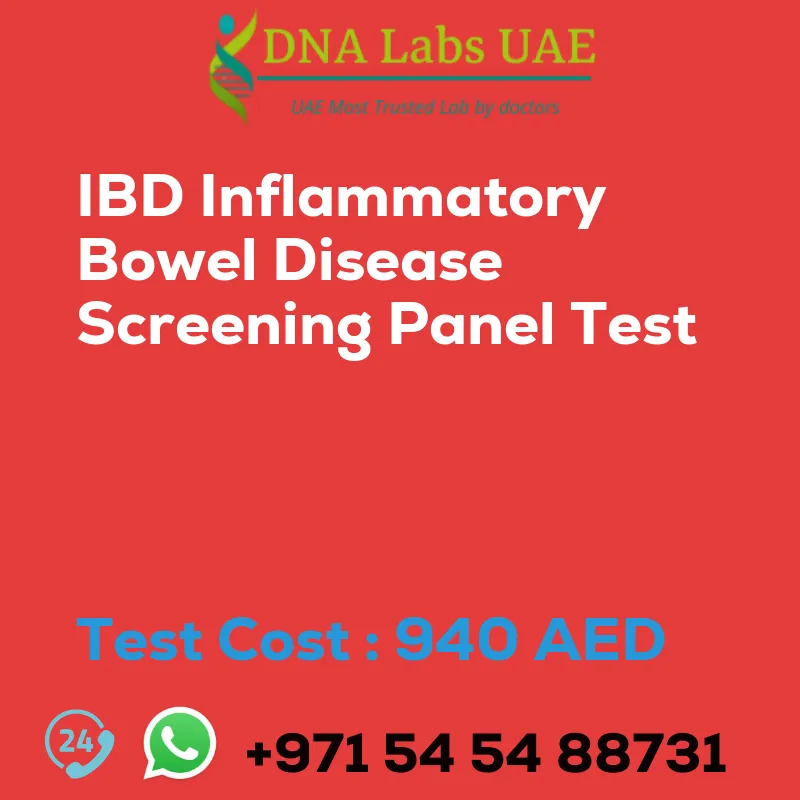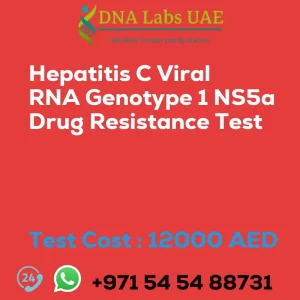IBD Inflammatory Bowel Disease Screening Panel Test
About the Test
The IBD (Inflammatory Bowel Disease) screening panel is a series of tests that are used to help diagnose and monitor inflammatory bowel diseases such as Crohn’s disease and ulcerative colitis. This panel typically includes the following tests:
- Complete blood count (CBC): This test measures the levels of red blood cells, white blood cells, and platelets in the blood. Abnormalities in these levels can indicate inflammation or infection in the body.
- C-reactive protein (CRP): CRP is a marker of inflammation in the body. Elevated levels of CRP may indicate active inflammation in the gastrointestinal tract.
- Erythrocyte sedimentation rate (ESR): ESR measures how quickly red blood cells settle at the bottom of a test tube. Elevated ESR levels can indicate inflammation in the body.
- Stool tests: Stool tests may be performed to check for the presence of blood, inflammation, or infection in the gastrointestinal tract.
- Colonoscopy: A colonoscopy is a procedure in which a flexible tube with a camera is inserted into the rectum and colon to examine the lining of the gastrointestinal tract. This can help identify any inflammation or abnormalities.
- Imaging tests: Imaging tests such as an abdominal CT scan or MRI may be performed to assess the extent of inflammation and identify any complications. These tests are not definitive for diagnosing IBD but can provide important information to help guide diagnosis and treatment decisions.
It is important to consult with a healthcare professional for a proper evaluation and interpretation of the results.
Test Components
- Fecal Calprotectin
- CRP
- CBC
- Stool examination occult blood
Price
Test cost: 940.0 AED
Sample Condition
2 mL (0.5 mL min.) serum from 1 SST AND 3 mL (2 mL min.) whole blood in 1 Lavender Top (EDTA) tube AND 5 g (3 g min.) stool in a leak-proof screw-capped container. Ship refrigerated. DO NOT FREEZE. Do not use matchbox or absorbent material. Patient should avoid meat products, pain killers, iron tablets, Vitamin C (Ascorbic Acid), and hard toothbrush for 3 days prior to specimen collection. Overnight fasting is preferred.
Report Delivery
Sample collection: Monday through Saturday by 9 am
Report delivery: Same day
Method
CLIA, Immunoturbidimetry, Electrical Impedance, VCS, Standard Guaiac
Test Type
Disorders of Gastroenterological Tract
Doctor
Gastroenterologist
Test Department
IMMUNOASSAY
Pre Test Information
Patient should avoid meat products, pain killers, iron tablets, Vitamin C (Ascorbic Acid), and hard toothbrush for 3 days prior to specimen collection. Overnight fasting is preferred.
| Test Name | IBD INFLAMMATORY BOWEL DISEASE SCREENING PANEL Test |
|---|---|
| Components | *Fecal Calprotectin *CRP *CBC *Stool examination occult blood |
| Price | 940.0 AED |
| Sample Condition | 2 mL (0.5 mL min.) serum from 1 SST AND 3 mL (2 mL min.) whole blood in 1 Lavender Top (EDTA) tube AND5 g(3 g min.)stoolinaleak-proof screwcappedcontainer.Ship refrigerated. DO NOT FREEZE. Donotuse matchboxorabsorbantmaterial.Patient shouldavoidmeatproducts,pain killers,irontablets, VitaminC (Ascorbic Acid)&hardtoothbrushfor3days priortospecimencollection.Overnight fasting is preferred.\n. |
| Report Delivery | SampleMon through Sat by 9 am; Report Same day |
| Method | CLIA, Immunoturbidimetry, Electrical Impedence, VCS, StandardGuaiac |
| Test type | Disorders of Gastroenterological Tract |
| Doctor | Gastroenterologist |
| Test Department: | IMMUNOASSAY |
| Pre Test Information | Patient shouldavoidmeatproducts,pain killers,irontablets, VitaminC (Ascorbic Acid)andhardtoothbrushfor3days priortospecimencollection. Overnight fasting is preferred. |
| Test Details |
The IBD (Inflammatory Bowel Disease) screening panel is a series of tests that are used to help diagnose and monitor inflammatory bowel diseases such as Crohn’s disease and ulcerative colitis. This panel typically includes the following tests: 1. Complete blood count (CBC): This test measures the levels of red blood cells, white blood cells, and platelets in the blood. Abnormalities in these levels can indicate inflammation or infection in the body. 2. C-reactive protein (CRP): CRP is a marker of inflammation in the body. Elevated levels of CRP may indicate active inflammation in the gastrointestinal tract. 3. Erythrocyte sedimentation rate (ESR): ESR measures how quickly red blood cells settle at the bottom of a test tube. Elevated ESR levels can indicate inflammation in the body. 4. Stool tests: Stool tests may be performed to check for the presence of blood, inflammation, or infection in the gastrointestinal tract. 5. Colonoscopy: A colonoscopy is a procedure in which a flexible tube with a camera is inserted into the rectum and colon to examine the lining of the gastrointestinal tract. This can help identify any inflammation or abnormalities. 6. Imaging tests: Imaging tests such as an abdominal CT scan or MRI may be performed to assess the extent of inflammation and identify any complications. These tests are not definitive for diagnosing IBD but can provide important information to help guide diagnosis and treatment decisions. It is important to consult with a healthcare professional for a proper evaluation and interpretation of the results. |







